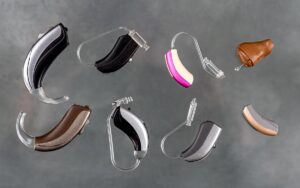Most estimates put the number of people affected by tinnitus in the millions or around one in every seven people. In a few countries, the numbers are even higher and that’s pretty startling.
Sometimes tinnitus is goes away on it’s own. But if you’re dealing with chronic tinnitus symptoms it becomes crucial to find a treatment as soon as possible. Luckily, there is a treatment that has proven to be quite effective: hearing aids.
Tinnitus and hearing loss are connected but distinct conditions. It’s possible to have tinnitus with average hearing or to have hearing loss without also getting tinnitus. But if you’re experiencing the two conditions together, which is relatively common, hearing aids can treat both at the same time.
How Can Tinnitus be Treated by Hearing Aids?
According to one survey, 60% of people with tinnitus observed some measure of relief when they began using hearing aids. Roughly 22% of everyone surveyed reported considerable relief. In spite of this, hearing aids are actually made to treat hearing loss not specifically tinnitus. Association seems to be the main reason for this benefit. As such, hearing aids appear to be most effective if you have tinnitus and hearing loss.
Here’s how tinnitus symptoms can be decreased with hearing aids:
- Outside sounds are boosted: When you experience hearing loss, the volume of the world (or, at least, certain frequencies of the world) can fade away and become more silent. The ringing in your ears, then, is a lot more noticeable. Hearing loss is not affecting the ringing so it becomes the most pronounced thing you hear. A hearing aid can enhance that surrounding sound, helping to drown out the buzzing or ringing that was so forefront before. Tinnitus becomes less of an issue as you pay less attention to it.
- It gets easier to engage in conversations: Amplifying human speech is something modern hearing aids are particularly good at. So once you’re wearing your hearing aids regularly, having conversations becomes much easier. You can follow the story Fred is telling at happy hour or listen to what Sally is excited about at work. When you have a balanced involved social life tinnitus can appear to fade into the background. Interacting socially also helps minimize stress, which is associated with tinnitus.
- The increased audio stimulation is keeping your brain fit: When you have hearing loss, those regions of your brain charged with interpreting sounds can frequently suffer from stress, fatigue, or atrophy. Using a hearing aid can keep the audio regions of your brain flexible and healthy, which as a result can help minimize certain tinnitus symptoms you might be experiencing.
Modern Hearing Aids Come With Several Benefits
Modern hearing aids are smart. To some degree, that’s because they integrate the latest technologies and hearing assistance algorithms. But it’s the ability to personalize a hearing aid to the specific user’s requirements that makes modern hearing aids so effective (sometimes, they recalibrate according to the amount of background noise).
Customizing hearing aids means that the sensitivity and output signals can easily be adjusted to the particular hearing levels you may have. The humming or buzzing is more likely to be successfully hidden if your hearing aid is dialed in to work best for you.
The Best Way to Get Rid of Tinnitus
Your degree of hearing loss will determine what’s best for you. There are still treatment solutions for your tinnitus even if you don’t have any hearing impairment. Cognitive behavioral therapy, a custom masking device, or medication are some possible options.
But, hearing aids may be able to take care of both situations if you have tinnitus and hearing loss at the same time. Stop tinnitus from making your life miserable by treating your hearing loss with a good pair of hearing aids.
[blogcta]





